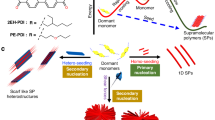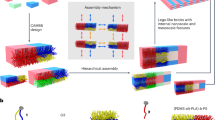Abstract
Enzymes efficiently synthesize biopolymers by organizing monomer units within regularly structured molecular-scale spaces and exploiting weak non-covalent interactions, such as hydrogen bonds, to control the polymerization1 process. This ‘template’ approach is both attractive and challenging for synthetic polymer synthesis, where structurally regulated molecular-scale spaces could in principle provide solid-phase reaction sites for precision polymerization. Previously, free-radical polymerization of methyl methacrylate in solutions containing stereoregular isotactic (it) or syndiotactic (st) poly(methyl methacrylate) (PMMA) has been shown to result in template synthesis2,3 of the opposite PMMA based on stereocomplex formation4,5 with van der Waals interactions. However, using the structure of a solid to determine the stereochemical structure of a polymer has not been satisfactorily achieved6. Here we show that macromolecularly porous ultrathin films, fabricated by a single assembly step, can be used for the highly efficient stereoregular template polymerization of methacrylates through stereocomplex formation. This reaction mould accurately transfers its structural properties of stereoregularity, molecular weight and organization within the template to the new polymer.
This is a preview of subscription content, access via your institution
Access options
Subscribe to this journal
Receive 51 print issues and online access
$199.00 per year
only $3.90 per issue
Buy this article
- Purchase on Springer Link
- Instant access to full article PDF
Prices may be subject to local taxes which are calculated during checkout



Similar content being viewed by others
References
Alberts, B. et al. Essential Cell Biology 2nd edn (Garland, New York, 2003)
Buter, R., Tan, Y. Y. & Challa, G. Radical polymerization of methyl methacrylate in the presence of isotactic poly(methyl methacrylate). J. Polym. Sci. A 10, 1031–1049 (1972)
Buter, R., Tan, Y. Y. & Challa, G. Radical polymerization of methyl methacrylate in the presence of stereoregular poly(methyl methacrylate). II. Syndiotactic PMMA as matrix. J. Polym. Sci. Polym. Chem. Edn 11, 1003–1011 (1973)
Spěváček, J. & Schneider, R. Aggregation of stereoregular poly(methyl methacrylates). Adv. Colloid Interface Sci. 27, 81–150 (1987)
Schomaker, E. & Challa, G. Complexation of stereoregular poly(methyl methacrylates). 14. The basic structure of the stereocomplex of isotactic and syndiotactic poly(methyl methacrylate). Macromolecules 22, 3337–3341 (1989)
Buter, R., Tan, Y. Y. & Challa, G. Radical polymerization of methyl methacrylate in the presence of stereoregular poly(methyl methacrylate). III. Influence of temperature. J. Polym. Sci. Polym. Chem. 11, 1013–1024 (1973)
Decher, G. in Multilayer Thin Films (eds Decher, G. & Schlenoff, J. B.) 1–46 (Wiley-VCH, Weinheim, 2003)
Serizawa, T. et al. Stepwise stereocomplex assembly of stereoregular poly(methyl methacrylate)s on a substrate. J. Am. Chem. Soc. 122, 1891–1899 (2000)
Serizawa, T. et al. Stepwise assembly of isotactic poly(methyl methacrylate) and syndiotactic poly(methacrylic acid) on a substrate. Langmuir 16, 7112–7115 (2000)
Hamada, K.-I. et al. Stepwise stereocomplex assembly of isotactic poly(methyl methacrylate) and syndiotactic poly(alkyl methacrylate)s on surfaces. Langmuir 17, 5513–5519 (2001)
Serizawa, T., Hamada, K.-I., Kitayama, T. & Akashi, M. Recognition of stereoregular polymers using structurally-regulated ultrathin polymer films. Angew. Chem. Int. Edn Engl. 42, 1118–1121 (2003)
Lohmeyer, J. H. G. M., Kransen, G., Tan, Y. Y. & Challa, G. Stereoassociation between poly(methyl methacrylate) and poly(methacrylic acid). Polym. Lett. Edn 13, 725–729 (1975)
Lohmeyer, J. H. G. M., Tan, Y. Y., Lako, P. & Challa, G. Stereoselective association between isotactic poly(methyl methacrylate) and syndiotactic poly(methacrylic acid). Polymer 19, 1171–1175 (1978)
Caruso, F., Caruso, R. A. & Möhwald, H. Nanoengineering of inorganic and hybrid hollow spheres by colloidal templating. Science 282, 1111–1114 (1998)
Lohmeyer, J. H. G. M., Tan, Y. Y. & Challa, G. Polymerization of methacrylic acid in the presence of isotactic poly(methyl methacrylate) as possible template. J. Macromol. Sci. A 14, 945–957 (1980)
Acknowledgements
We thank K. Hatada and T. Kitayama for technological support of living anionic polymerization.
Author information
Authors and Affiliations
Corresponding author
Ethics declarations
Competing interests
The authors declare that they have no competing financial interests.
Rights and permissions
About this article
Cite this article
Serizawa, T., Hamada, Ki. & Akashi, M. Polymerization within a molecular-scale stereoregular template. Nature 429, 52–55 (2004). https://doi.org/10.1038/nature02525
Received:
Accepted:
Issue Date:
DOI: https://doi.org/10.1038/nature02525
This article is cited by
-
Molecular signaling in pancreatic ductal metaplasia: emerging biomarkers for detection and intervention of early pancreatic cancer
Cellular Oncology (2022)
-
Cobalt -mediated radical polymerization of vinyl acetate in a packed column system: simultaneous effective control of molecular weight, separation, and purification
Journal of Polymer Research (2022)
-
Nanoarchitectonics for Nanocarbon Assembly and Composite
Journal of Inorganic and Organometallic Polymers and Materials (2020)
-
Stereochemical enhancement of polymer properties
Nature Reviews Chemistry (2019)
-
Pentaerythritol particles covered by layer-by-layer self assembled thin films with stereocomplex of isotactic poly(methyl methacrylate) and syndiotactic poly(methyl methacrylate)
Colloid and Polymer Science (2017)
Comments
By submitting a comment you agree to abide by our Terms and Community Guidelines. If you find something abusive or that does not comply with our terms or guidelines please flag it as inappropriate.



